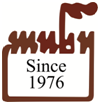Desvenlafaxine Succinate Monohydrate Anhydrous USP NF Grade Manufacturers, with SDS GHS MSDS Sheet |
Supplier, Manufacturer, Exporter of Desvenlafaxine Succinate Monohydrate Anhydrous USP NF Grade, Muby Chemicals of Mubychem Group, established in 1976, is the original manufacturers of Specialty Chemicals, Pharmaceutical Excipient, Fragrance Food & Flavor chemicals, Reagent Grade Chemicals, Shale Gas Fracturing Chemicals in India. Mubychem Group has several manufacturing facilities spread across Western India and world wide contacts and toll manufacturers. We are exporting globally to countries like USA, Canada, Europe, UAE, South Africa, Tanzania, Kenya, Egypt, Nigeria, Cameroon, Uganda, Turkey, Mexico, Brazil, Chile, Argentina, Dubai, Korea, Vietnam, Thailand, Malaysia, Indonesia, Australia, China, Germany, France, Italy Portugal, Bangladesh, etc. The products are offered as per required specifications and in correct shape and size in mm or meshs or microns as specified by the buyer. The participating units have one or more accreditations like FDA - cGMP and GLP approval, ISO-9001 Certified, "REACH" Registered, ISO-14001, ISO/IEC 17025, ISO-22000, FSSC 22000, ISO 45001, Kosher Certified, Halal Certified, HACCP, FSSAI. We offer Commercial Pure & IP BP EP Ph Eur USP NF JP FCC Food Grade Analytical Reagent Grades of Chemicals |
| Bookmark this Web Site -- or -- Email This Page Info to a Colleague or Yourself |
Search our website here:







Desvenlafaxine Succinate Monohydrate Anhydrous CAS Number 386750-22-7 monohydrate and 448904-47-0 anhydrous, EINECS EC Number: 692-113-2, Molecular Formula: C16H25NO2-C4H6O4-H2O monohydrate and C16H25NO2-C4H6O4 anhydrous, Molecular Weight: 399.48 monohydrate and 381.47 anhydrous, HS Code 29225025 or 29225045
How big is your requirement or how small
We serve it all.
Specifications, Safety Data Sheet, Manufacturing process details, Wholesale retail buy sell prices, Uses etc available on line in these pages for Desvenlafaxine Succinate Monohydrate Anhydrous.
For SDS MSDS Sheet Click
SDS MSDS Sheet of Desvenlafaxine Succinate Monohydrate Anhydrous Manufacturers
Desvenlafaxine Succinate
Monohydrate Anhydrous USP NF Grade Suppliers

Desvenlafaxine Succinate is used as an antidepressant and for anxiety disorder.
General Properties and Specifications of Desvenlafaxine Succinate or Desvenlafaxine Succinate Monohydrate:
Appearance: White to Off-White Powder.
Assay: >98%
Melting Point: 127C to 135C.
Solubility: Soluble in water and DMSO.
Storage: Refrigerate. OK to freeze. Short-term shipping may be ambient.
Desvenlafaxine Succinate USP NF Grade Specifications:
C16H25NO2-C4H6O4-H2O --- 399.48
C16H25NO2-C4H6O4 --- 381.47
Butanedioic acid, compound with 4-[2-(dimethylamino)-1-(1-hydroxycyclohexyl)ethyl]phenol (1:1), monohydrate;
1-[2-(Dimethylamino)-1-(4-hydroxyphenyl)ethyl]cyclohexanol hydrogen butanedioate monohydrate CAS 386750-22-7
UNII: ZB22ENF0XR
Anhydrous CAS 448904-47-0
UNII: H9E1T0BI90.
DEFINITION
Desvenlafaxine Succinate contains NLT 98.0% and NMT 102.0% of desvenlafaxine succinate C16H25NO2•C4H6O4), calculated on the anhydrous basis.
IDENTIFICATION
A. SPECTROSCOPIC IDENTIFICATION TESTS, Infrared Spectroscopy.
B. The retention time of the major peak of the Sample solution corresponds to that of the Standard solution, as obtained in the Assay.
Organic Impurities: To pass the test.
Water Determination: 4.0% to 5.2%
For Original Monographs of IP Indian Pharmacopoeia EP Ph Eur European Pharmacopoeia BP British Pharmacopoeia USP US Pharmacopoeia FCC Food Grade product, please check with the respective web-pages or books.
We also manufacture and supply as under:
Hypromellose Acetate Succinate
Desvenlafaxine Succinate Monohydrate Anhydrous.
Manufacturers:
MUBY CHEMICALS
Ambernath Mumbai, Ankleshwar Gujarat, India
TEL: (OFFICE) +912223770100, +912223726950
Current Date Time in India GMT+5:30
e-mail: info@mubychem.com
USA, Canada, Mexico and other American neighbouring buyers may
e-mail: us@mubychem.com
Call toll-free 1-877-682-9243 (1-877-MUBYCHEM)

Copyright and Usual Disclaimer is Applicable.
Last 25 November, 2025




Exporters to USA Canada UAE Europe South Africa Tanzania Kenya Uganda Egypt Nigeria Turkey Mexico Brazil Argentina Chile Dubai etc.
Global or International Suppliers, Exporters, Importers, Manufacturers
I shall pass through this world, but once. If therefore, there is any good that I can do, or if there is any favor that I can show to a fellow human being, let me do it now. Let me not defer or neglect it. For I shall not tread this way again
Desvenlafaxine Succinate or Desvenlafaxine Succinate Monohydrate SDS Sheet, Safety Data Sheet
MSDS Sheet, Material Safety Data Sheet 26-Nov-24
1. Product Identification
Product Name & Other Names: Desvenlafaxine Succinate or Desvenlafaxine Succinate Monohydrate.
CAS No.: 386750-22-7
EINECS EC Code: 692-113-2
Relevant uses and uses advised against (if any): Industrial Manufacturing.
SUPPLIER: As per letterhead.
2. Hazards Identification
GHS, Globally Harmonized System Classification in accordance with 29 CFR 1910
Classification according to Regulation (EC) No 1272/2008
Not a hazardous substance or mixture according to Regulation (EC) No. 1272/2008.
This substance is not classified as dangerous according to Directive 67/548/EEC.
Labeling according to GHS & Regulation (EC) No 1272/2008
GHS Label Elements NONE |
Signal Words: None
Hazards not otherwise classified (HNOC):
May cause mild skin irritation.
May cause mild eye irritation.
May cause mild respiratory irritation.
Precautionary statements:
P261: Avoid breathing dust/fume/gas/mist/vapors/spray.
P262: Do not get in eyes, on skin, or on clothing.
P281: Use personal protective equipment as required.
P302+P352: IF ON SKIN: Wash with plenty of soap and water.
P304+P340: IF INHALED: Remove victim to fresh air and keep at rest in a comfortable position for breathing.
P305+P351+P338: IF IN EYES: Rinse cautiously with water for several minutes. Remove contact lenses, if present and easy to do. Continue rinsing.
P337+313: If eye irritation persists get medical advice/attention.
3. Composition/Information on Ingredients
Product Name & Other Names: Desvenlafaxine Succinate or Desvenlafaxine Succinate Monohydrate.
CAS No.: 386750-22-7
EINECS EC Code: 692-113-2
4. First Aid Measures
Always seek medical advice after the first aid treatment.
Inhalation: If inhaled, remove to fresh air. If not breathing, give artificial respiration. If breathing is difficult, give oxygen. Get medical attention.
Ingestion: Contact the medical center quickly. Never give anything by mouth to an unconscious person. Get medical attention.
Skin Contact: Immediately flush skin with plenty of water for at least 15 minutes. Remove contaminated clothing and shoes. Get medical attention.
Eye Contact: Check for and remove any contact lenses. Immediately flush your eyes with running water for at least 15 minutes, keeping eyelids open. Cold water may be used. Get medical attention.
5. Fire Fighting Measures
Combustible at high temperature. High heat or direct flame is necessary to cause ignition. Toxic fumes, carbon monoxide and nitrogen oxides may be formed in fire.
Explosion: At high temperature, explosive vapor-air mixtures may be formed.
Fire Extinguishing Media: Dry chemical, foam, water spray or carbon dioxide. Do not use a solid stream of water since the stream will scatter and spread the fire.
Special Information: In the event of a fire, wear full protective clothing and NIOSH-approved self-contained breathing apparatus with full face piece operated in the pressure demand or other positive pressure mode.
6. Accidental Release Measures
Personal precautions, protective equipment, and emergency procedures: Avoid breathing dust/fumes/gas/mist/vapors/spray. Use individual protective equipment (waterproof boots, suitable protective clothing, safety glasses, etc.).
Environmental precautions: Do not let the product enter drains, soil, or water sources.
Methods and materials used for containment cleanup procedures and Storage:
Small Spill: Mop and pick up the material and place it in an appropriate waste disposal container.
Large Spill: Avoid dust formation. Keep away from heat. Keep away from sources of ignition. Provide ventilation. Contain spilled material. Cover with an inert, non-combustible absorbent material, (e.g., sand, earth, diatomaceous earth, vermiculite). Vacuum or sweep-up and remove it into an approved disposal container.
7. Handling and Storage
Precautions for safe handling: Apply according to good manufacturing and industrial hygiene practices. Ensure proper ventilation. Wash thoroughly after handling it. Do not drink, eat, or smoke while handling. Avoid contact with skin, eyes, and clothing. Minimize dust generation. Avoid breathing dust/fumes/gas/mist/vapors/spray. Keep the container tightly closed. Avoid ingestion and inhalation. Use individual protective equipment (waterproof boots, suitable protective clothing, safety glasses, etc.).
Conditions for safe storage, including any incompatibilities: Keep away from heat and source of fire. Store in cold, dry, and ventilated area away from heat sources and protected from sunlight in tightly closed original containers. Keep air contact to a minimum. Do not breathe dust. Do not leave the material container open. Store protected from heat, sparks and ignition sources and incompatible materials. Avoid inhalation of dust/mist/vapor. Do not store with incompatible materials like oxidizing material. Storage : Refrigerate.
8. Exposure Controls/Personal Protection
Airborne Exposure Limits: The product does not contain any relevant quantities of materials with critical values that have to be monitored at the workplace.
Ventilation System: A system of local and/or general exhaust is recommended to keep employee exposures low.
Personal Respirators (NIOSH Approved): For conditions of use where exposure to the substance is apparent and engineering controls are not feasible, consult an industrial hygienist.
Skin Protection: Wear impervious protective clothing, including boots, gloves, lab coat, apron, or coveralls, as appropriate, to prevent skin contact.
Eye Protection: Use chemical safety goggles and/or a full-face shield where splashing is possible. Maintain eye wash fountain and quick-drench facilities in work area.
Other Control Measures: Maintain good housekeeping in work area. Handle in accordance with good industrial hygiene and safety practice. Wash hands after handling.
9. Physical and Chemical Properties
Appearance: White to Off-White Powder.
Odor: No information available.
Odor threshold: No information available.
pH: No information available.
Melting point: 127C to 135C.
Boiling point: No information available.
Relative density: No information available.
Flash point: No information available.
Auto-ignition temperature: No information available.
Decomposition temperature: No information available.
Upper/lower flammability or explosive limits: No information available.
Vapor pressure: No information available.
Vapor density: No information available.
Evaporation rate: No information available.
Flammability (solid, gas): No information available.
Partition coefficient: n-octanol/water: No information available.
Solubility: Soluble in water and DMSO.
Viscosity: No information available.
Molecular Weight: 399.48
Chemical Formula: C16H25NO2•C4H6O4•H2O
10. Stability and Reactivity
Stability: Stable under ordinary conditions of use and storage.
Hazardous Decomposition Products: Carbon dioxide, carbon monoxide, nitrogen oxides and toxic fumes may form when heated to decomposition.
Hazardous Polymerization: Not reported. However, it can explode under certain conditions.
Incompatibilities: Strong oxidizing agents, heat, and sparks.
Conditions to Avoid: Heat, flames, sunlight, ignition sources and incompatibles.
11. Toxicological Information
Oral Rat LD50: No information available.
Carcinogenicity: Not identified as possible or confirmed human carcinogen by IARC, ACGIH, OSHA and NTP.
Teratogenic Effects: No information available.
Mutagenic Effects: No information available.
Developmental Toxicity: No information available.
Reproductive Effects: No information available.
12. Ecological Information
Toxicity to fish: No information available.
Mobility: Likely to be mobile due to water solubility.
Biodegradability: Expected to be biodegradable
Results of PBT and vPvB assessment: No data found for assessment.
13. Disposal Considerations
Whatever cannot be saved for recovery or recycling should be managed in an appropriate and approved waste disposal facility.
14. Transport Information
DOT USA & ADR/RID Europe: Not dangerous goods.
IMDG/IMO: Not dangerous goods.
IATA/ICAO: Not dangerous goods.
15. Regulatory Information
USA:
SARA 311/312 Hazards: No SARA hazardsSee section 2.
California Prop. 65 Components: Not listed.
16. Other Information
Disclaimer:
**************************
Our company provides this MSDS sheet in good faith but makes no representation as to its comprehensiveness or accuracy. This SDS sheet is intended only as a guide to the appropriate precautionary handling of the material by a properly trained person using this product. The above information has been compiled from various sources and has the possibility of discrepancy and being out-dated information. Individuals receiving the information must exercise their independent judgment and do further search in determining its appropriateness for a particular purpose. In no case shall our company be liable to loss or damages by the product user.
**************************
















